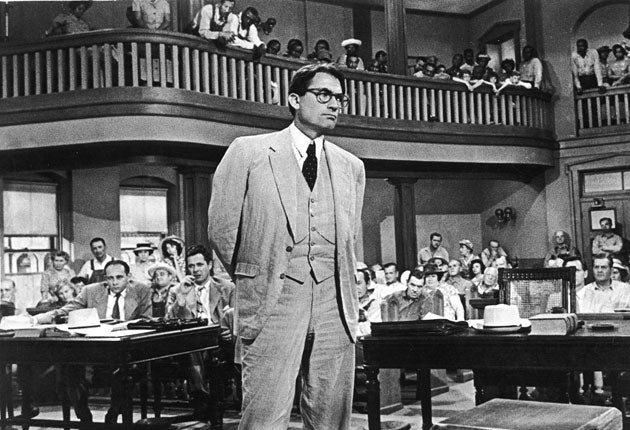Rupert Cornwell: Why Harper Lee is likely to miss her own party
Out of America: 'To Kill a Mockingbird' is 50, its author reclusive

The celebrations will last the summer, as befits the 50th anniversary of the book that British librarians a few years ago voted top of a must-read list before you die (ahead of the likes of the Bible, Orwell's 1984 and Jane Austen's Pride and Prejudice, to name but three others in the top 10). There's just one problem. The guest of honour at the party almost certainly won't show up.
To Kill a Mockingbird, Harper Lee's haunting and inspiring novel about the collision of childhood innocence with the realities of race and racial injustice in the Depression-era South, was first published in July 1960. Since then, it has sold about a million copies a year, become a fixture on every school reading list in the country, and been translated into 40 languages. But Lee herself more or less vanished from the face of the earth. She is 84 now, and living in a retirement home in the small, God-fearing town of Monroeville where she was born. It is a place of 7,000 inhabitants in deepest Alabama, with 28 churches and where everyone refers to the most famous, if rarely sighted, local resident by her first name of Nelle.
After Mockingbird she published nothing else and since 1964 has never given an interview, complaining that the questions were always the same. She's made the odd public appearance, to receive a literary award or an honorary degree and in 2007 she received the Presidential Medal of Freedom from George W Bush.
When the book appeared to glowing reviews, people clamoured for details of America's new literary sensation but to little avail. "I'm afraid a biographical sketch of me will be sketchy indeed," she wrote to an inquirer. "With the exception of M'bird, nothing of any particular interest to anyone has happened to me in my 34 years." Half a century on, her reply would surely be identical.
For that reason, no one at HarperCollins, her publishers, is getting their hopes up that the lady will have much to do with this summer's festivities across the US – which include readings, learned literary and historical discussions, as well as special screenings of the 1962 film, starring Gregory Peck, of which Lee had nothing but good words.
To Kill a Mockingbird has been described as "America's national novel", and must certainly be its most read fictional work about race. In reality it is two stories fused into one: of a child's recollections of family, friendship and growing up, and of the courtroom drama that is its centrepiece, dealing with the trial and wrongful conviction of a black man accused of raping a young white woman, which for ever changes the way the child sees the world.
The book is also probably the best way to discover who exactly is Harper Lee. In To Kill a Mockingbird, thinly disguised autobiographical elements abound. For Monroeville, read the fictional Maycomb. For the author, read the young narrator, Scout, a tomboy just like Lee was as a girl. Elements of Scout's father, the small-town lawyer Atticus Finch – played by Peck in the film and abused as a "nigger-lover" for his willingness to defend the accused black man Tom Robinson – are surely modelled on her own father, A C Lee.
The themes of the book echo down the decades. Just the other day I was glued to a harrowing public radio documentary about the real-life case of Willie McGee, convicted of raping a white woman in Mississippi when all the evidence suggested she had made sexual advances to him. Despite international protest, McGee was put to death in 1951.
Most intriguing of all is the Capote connection. Harper Lee's best childhood friend was a boy called Truman Persons, who lived next door, until he left Monroeville when his mother remarried. His stepfather adopted him and Truman Persons became Truman Capote. In the novel, the Capote figure is Scout's friend Dill, who lives next door in Maycomb with relatives. Lee and Capote remained close for many years. He helped her edit To Kill a Mockingbird, while she helped him research In Cold Blood, about the savage murder of a wealthy Kansas farmer and his family. In Cold Blood, however, did not appear until 1966, by which time Lee was a superstar, and some maintain it was out of jealousy at her success that Capote made no effort to dispel the utterly unfounded suggestions that he was virtually co-author of Mockingbird. The pair drifted apart, and when Capote died in 1984, Lee reportedly told a friend they had not been in touch for years.
Thereafter, try as she might, Harper Lee has never achieved the anonymity she seeks. "All I want to be is the Jane Austen of south Alabama," she confided in some long ago interview. If those British librarians are right, she has succeeded – and then some.
Join our commenting forum
Join thought-provoking conversations, follow other Independent readers and see their replies
Comments
Bookmark popover
Removed from bookmarks